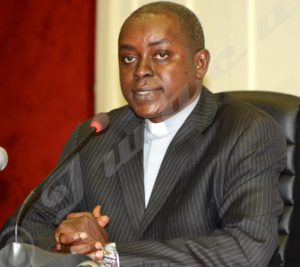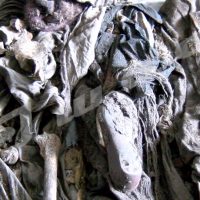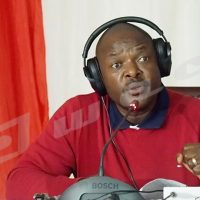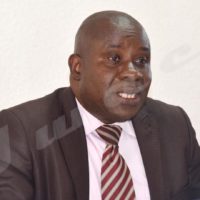Challenged, accused of being ineffective and inappropriate, the Truth and Reconciliation Commission (TRC) is far from winning unanimous support. Bishop Nahimana, the president of the commission is confident, however and makes a plea.
 Since its inception, the TRC has not won unanimous support, what about today?
Since its inception, the TRC has not won unanimous support, what about today?
The TRC, which took a long time to be set up, was put in place when the country was plunged into a new crisis that arose following the failures of the electoral process. This does not really encourage the emergence of the truth in a context where the interests of people in general and all political actors in particular have turned elsewhere. There has been much debate, especially the opposition parties that said it was not the right time to set up the TRC.
But this period has passed…
There is also a challenge on the part of technical and financial partners, including the international community, which was interested in the mission of the TRC, but the priority of which was the election.
Unfortunately, we witnessed how these elections took place and controversy that gave rise to the crisis that erupted. By the time it was thought that people would make do with the TRC, firemen had to be called out to try to limit the damage.
Were TRC protagonists right?
The TRC is assessed differently by people. But I think judging a priori its work is a mistake. I visited a few countries that have experience of transitional justice. None of their commissions like ours has met unanimity on its mission. It’s always after work that these commissions have forged their credibility. Even here, we must wait for the TRC to go to work, approach people and put in place mechanisms for transparency, but above all, the participation of the population. At the stage where we are, in context, it may be difficult to convince as we lack verifiable facts.
How will you approach the entire population while some Burundians are in prison, in exile or refugee camps?
All is the question of conviction. What I found, since the few months that I am at the head of this commission, it is a kind of lethargy.
I have the impression that I am in front of the population that suffered a lot, experienced many disappointments and ended up in fatality. And, unfortunately, they wonder what may come out of that commission. They do not want to respond to the invitations from the commission and seem eager to see its achievements.
Do you think it will be easy?
There are many ways for the truth to emerge, especially with communication technology. The problem lies in the investigation phase to check the veracity of these testimonies. The TRC cannot claim to fulfill its mission without listening to Burundians who are outside the country. We plan to either meet with them or the associations that represent them. In my opinion, it will be easier for people who are outside the country to testify because they are freer than those who are here in the country, given the current context. One thing is to meet them, to especially prepare them to meet with the commission, get them to collaborate with it during this period.
Today the commission is at the stage of deposition registration. Some are wondering what difference might be between complaints and testimonies…
There is much confusion on the subject. The TRC is a non-judicial mechanism, but of truth, to reconcile Burundians, not to track down people. We recently had an unfortunate case of a published list of alleged guilty people. Only justice has jurisdiction to sentence people. This is why the mission of the TRC requires experts to help us really understand what happened after having gathered evidence and made investigations
Apparently the task ahead is huge, the TRC only has two years. Is it sufficient?
Yes and no. We will not listen exhaustively to all Burundians, but we will focus on historical sequences, periods during which there were massive violations of human rights.
What are those times?
In 1962, with the famous case of trade unionists in Kamenge, in 1965, when we really witnessed the first massive violations of human rights, or in 1969, when there was an abortive coup followed by a crackdown that exceeded the limits. In 1971, people from Muramvya province were also falsely accused of the same offense. The climax was in 1972 and then in 1988 with Ntega and Marangara. But already in 1979, opponents like Ntibantunganya and Ndadaye had to flee the country, and the TRC will take a keen interest in that, too. In 1991 there was a well known attack by Palipehutu in Bujumbura. Since 1993, there was a war that lasted for over 13 years. Although the mandate of the TRC will not exceed 2008, people continue to die until today.
Despite the lack of resources that you have raised, the TRC continues his mission. How do you manage?
It’s true that the commission is going through difficult times, almost precarious ones, given the means at its disposal. For example, the law states that there should be branches of the commission in all provinces, but no financial means. We have only a seat in Bujumbura, and even our staff is insufficient. We have to adjust ourselves, and this is why we consider it a good idea to start with the deposition phase at Bujumbura which is a cosmopolitan city and the showcase of the country. But instead of remaining idle, we decided to get to work waiting for better days.
How do you assess the current phase of the TRC?
It is still too early to say.
The first observation however is that people are not sufficiently sensitized and prepared.
Do people feel reassured?
This is a very important issue. For our mission to be fulfilled, it is necessary that victims be given priority. Mechanisms to protect witnesses are provided for. The ideal would be to put them in place before the deposition phase, which will however be carried out behind closed doors.
But there are steps that we cannot begin until these mechanisms are put in place, including hearings or confrontations between the victims and the accused. They are mechanisms that are already there, but which also require a lot of resources. For example, if there are witnesses who must be exfiltrated for security reasons. It’s a job that requires the study of all possible risks and how to deal with them.
Today the TRC seems to be left to itself. If you were to call for support, what would you say?
I first of all launch an appeal to victims whose testimonies are the foundation of the work of the commission. There are the so-called victims’ associations that have a very important role of sensitizing people, instead of being critical to the TRC all the time. We also launch an appeal to the government. One thing is to have the courage to put the commission in place, which we welcome. The other thing is to grant means to the commission so that it can do its job accordingly.
Finally, we ask the international community to support us.
I remain convinced that the TRC is an opportunity for Burundi. If we miss this opportunity, I think it will be difficult to have another commission. It took 14 years to be set up, if it misses its mission, it will take at least 30 years for another.



















 IWACU Open Data
IWACU Open Data

